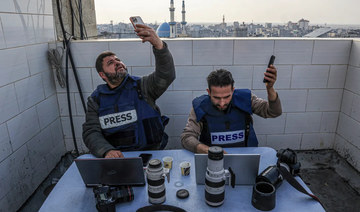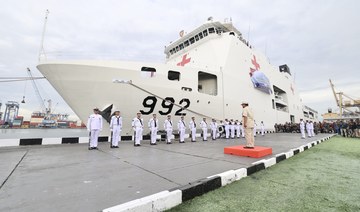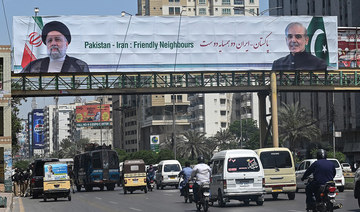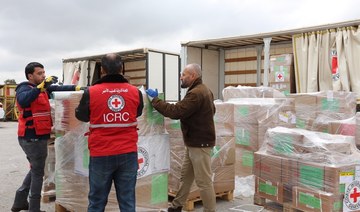RAFAH: Palestinian groom Mohammed Al-Ghandour wanted to give his bride a beautiful wedding but after war began in Gaza they had to flee their homes and the couple finally got married this week in the tent city where they now live.
Ghandour led his wife Shahad by the hand toward the tent decorated with some colored lights and a mirror with a gold-colored frame as a few relatives escorted them, clapping in time.
Inside the tent Shahad, wearing a white dress and veil with traditional red embroidery, lifted her hand and Ghandour put a ring on it.
“I wanted a party. I wanted a celebration, a wedding. I wanted to invite my friends, my relatives and my cousins, like anyone would,” said Ghandour.
The couple are from Gaza City in the north of the tiny enclave where some of the worst of Israel’s heavy bombardment and the fighting between it and Hamas have taken place since the war began on Oct. 7.
The homes of both Ghandour’s family and Shahad’s family were destroyed in Israeli airstrikes, they said, and they lost cousins and other family members in the bombardment.
“My happiness is maybe at 3 percent but will get myself ready for my wife. I want to make her happy,” said Ghandour.
The war began when Hamas fighters rampaged into Israel, killing more than 1,200 people, mostly civilians, and taking 240 hostages. Israel’s bombardment and assault into Gaza have killed more than 24,760 people according to health authorities there.
Instead of the big party that Ghandour had wanted, he and Shahad had a small group of relatives who like them had managed to leave Gaza City and flee to Rafah, at the far southern end of the strip next to Egypt.
Shahad’s mother led a small group of women ululating in celebration of the marriage and somebody had saved batteries for a small portable music player.
For a wedding feast in an enclave that the UN warns is heading toward famine, the couple had only a few snacks in plastic package, laid out carefully for them in the tent.
Both families had already spent lots of money on the wedding before the war began. Shahad had spent more than $2,000 on clothes, they said.
“My dream was to give Shahad the best wedding, the most beautiful in the world,” said her mother, Umm Yahia Khalifa.
“We prepared her wedding things and she was happy. But it is all gone in the shelling. Every time she remembers she starts to cry,” she said.
As the small wedding party began to clap and dance, people around them went about their daily chores among the lines of tents stretched across the sand, seeking food or hanging laundry.
A small girl in a pink and white dress smiled broadly as the clapping began and joined a group of other children dancing as the sun set behind the high border fence topped with barbed wire.
Gaza couple marry in tent city by barbed wire border fence
https://arab.news/2hhyv
Gaza couple marry in tent city by barbed wire border fence
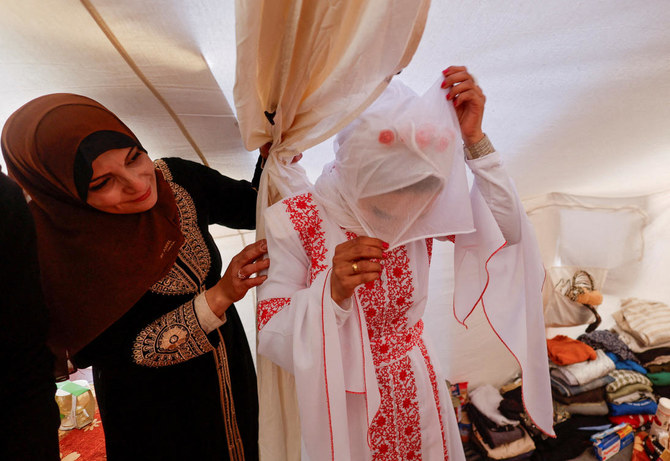
- Ghandour led his wife Shahad by the hand toward the tent decorated with some colored lights
- Inside the tent Shahad, wearing a white dress and veil with traditional red embroidery, lifted her hand and Ghandour put a ring on it
UN chief calls for ‘immediate’ Gaza ceasefire, hostage release

- Israeli strikes on Gaza continued Sunday after it expanded evacuation order for Rafah operation
- Gaza war tearing families apart, rendering people homeless, hungry and traumatized, says UN chief
KUWAIT CITY: UN Secretary-General Antonio Guterres on Sunday urged an immediate halt to the Israel-Hamas war in Gaza, the return of hostages and a “surge” in humanitarian aid to the besieged Palestinian territory.
“I repeat my call, the world’s call for an immediate humanitarian ceasefire, the unconditional release of all hostages and an immediate surge in humanitarian aid,” Guterres said in a video address to an international donors’ conference in Kuwait.
“But a ceasefire will only be the start. It will be a long road back from the devastation and trauma of this war,” he added.
Israeli strikes on Gaza continued on Sunday after it expanded an evacuation order for Rafah despite international outcry over its military incursion into eastern areas of the city, effectively shutting a key aid crossing.
“The war in Gaza is causing horrific human suffering, devastating lives, tearing families apart and rendering huge numbers of people homeless, hungry and traumatized,” Guterres said.
His remarks were played at the opening of the conference in Kuwait organized by the International Islamic Charitable Organization (IICO) and the UN’s humanitarian coordination organization OCHA.
On Friday, in Nairobi, the UN head warned Gaza faced an “epic humanitarian disaster” if Israel launched a full-scale ground operation in Rafah.
Gaza’s bloodiest-ever war began following Hamas’s unprecedented October 7 attack on Israel that resulted in the deaths of more than 1,170 people, mostly civilians, according to an AFP tally of Israeli official figures.
Vowing to destroy Hamas, Israel launched a retaliatory offensive that has killed more than 34,971 people in Gaza, mostly women and children, according to the Hamas-run territory’s health ministry.
UN chief calls for ‘immediate’ Gaza ceasefire, hostage release

- UN chief: ‘The war in Gaza is causing horrific human suffering, devastating lives, tearing families apart and rendering huge numbers of people homeless, hungry and traumatized’
KUWAIT CITY: UN Secretary-General Antonio Guterres on Sunday urged an immediate halt to the Israel-Hamas war in Gaza, the return of hostages and a “surge” in humanitarian aid to the besieged Palestinian territory.
“I repeat my call, the world’s call for an immediate humanitarian ceasefire, the unconditional release of all hostages and an immediate surge in humanitarian aid,” Guterres said in a video address to an international donors’ conference in Kuwait.
“But a ceasefire will only be the start. It will be a long road back from the devastation and trauma of this war,” he added.
Israeli strikes on Gaza continued on Sunday after it expanded an evacuation order for Rafah despite international outcry over its military incursion into eastern areas of the city, effectively shutting a key aid crossing.
“The war in Gaza is causing horrific human suffering, devastating lives, tearing families apart and rendering huge numbers of people homeless, hungry and traumatized,” Guterres said.
His remarks were played at the opening of the conference in Kuwait organized by the International Islamic Charitable Organization (IICO) and the UN’s humanitarian coordination organization OCHA.
On Friday, in Nairobi, the UN head warned Gaza faced an “epic humanitarian disaster” if Israel launched a full-scale ground operation in Rafah.
Gaza’s bloodiest-ever war began following Hamas’s unprecedented October 7 attack on Israel that resulted in the deaths of more than 1,170 people, mostly civilians, according to an AFP tally of Israeli official figures.
Vowing to destroy Hamas, Israel launched a retaliatory offensive that has killed more than 34,971 people in Gaza, mostly women and children, according to the Hamas-run territory’s health ministry.
Iran conservatives tighten grip in parliament vote

- Elected members are to choose a speaker for the 290-seat parliament when they begin their work on May 27
- Conservatives won the majority of the 45 remaining seats up for grabs in the vote held in 15 of 31 provinces: local media
TEHRAN: Iran’s conservatives and ultra-conservatives clinched more seats in a partial rerun of the country’s parliamentary elections, official results showed Saturday, tightening their hold on the chamber.
Voters had been called to cast ballots again on Friday in regions where candidates failed to gain enough votes in the March 1 election, which saw the lowest turnout — 41 percent — since the 1979 Islamic Revolution.
Candidates categorized as conservative or ultra-conservative on pre-election lists won the majority of the 45 remaining seats up for grabs in the vote held in 15 of Iran’s 31 provinces, according to local media.
For the first time in the country, voting on Friday was a completely electronic process at eight of the 22 constituencies in Tehran and the cities of Tabriz in the northwest and Shiraz in the south, state TV said.
“Usually, the participation in the second round is less than the first round,” Interior Minister Ahmad Vahidi told reporters in Tehran, without specifying what the turnout was in the latest round.
“Contrary to some predictions, all the candidates had a relatively acceptable and good number of votes,” he added.
Elected members are to choose a speaker for the 290-seat parliament when they begin their work on May 27.
In March, 25 million Iranians took part in the election out of 61 million eligible voters.
The main coalition of reform parties, the Reform Front, had said ahead of the first round that it would not participate in “meaningless, non-competitive and ineffective elections.”
The vote was the first since nationwide protests broke out following the September 2022 death in custody of Mahsa Amini, a 22-year-old Iranian Kurd, arrested for allegedly breaching the Islamic republic’s strict dress code for women.
In the 2016 parliamentary elections, first-round turnout was above 61 percent, before falling to 42.57 percent in 2020 when elections took place during the Covid pandemic.
UN reports fighting in Sudan’s Darfur involving ‘heavy weaponry’

- The United States last month warned of a looming rebel military offensive on the city, a humanitarian hub that appears to be at the center of a newly opening front in the country’s civil war
PORT SUDAN: A major city in Sudan’s western region of Darfur has been rocked by fighting involving “heavy weaponry,” a senior UN official said Saturday.
Violence erupted in populated areas of El-Fasher, putting about 800,000 people at risk, Clementine Nkweta-Salami, the UN’s humanitarian coordinator for Sudan, said in a statement.
Wounded civilians were being rushed to hospital and civilians were trying to flee the fighting, she added.
“I am gravely concerned by the eruption of clashes in (El-Fasher) despite repeated calls to parties to the conflict to refrain from attacking the city,” said Nkweta-Salami.
“I am equally disturbed by reports of the use of heavy weaponry and attacks in highly populated areas in the city center and the outskirts of (El-Fasher), resulting in multiple casualties,” she added.
For more than a year, Sudan has suffered a war between the army, headed by the country’s de facto leader Abdel Fattah Al-Burhan, and the paramilitary Rapid Support Forces (RSF), commanded by his former deputy Mohamed Hamdan Dagalo.
The war has killed tens of thousands of people and forced more than 8.5 million to flee their homes in what the United Nations has called the “largest displacement crisis in the world.”
The RSF has seized four out of five state capitals in Darfur, a region about the size of France and home to around one quarter of Sudan’s 48 million people.
El-Fasher is the last major city in Darfur that is not under paramilitary control and the United States warned last month of a looming offensive on the city.
UN chief Antonio Guterres said Saturday he was “very concerned about the ongoing war in Sudan.”
“We need an urgent ceasefire and a coordinated international effort to deliver a political process that can get the country back on track,” he said in a post on social media site X.
Tunisian police arrest prominent lawyer critical of president

- Dozens of lawyers took to the streets in protest on Saturday night, carrying banners reading “Our profession will not kneel” and “We will continue the struggle” Saied came to power in free elections in 2019
TUNIS: Tunisian police stormed the building of the Deanship of Lawyers on Saturday and arrested Sonia Dahmani, a lawyer known for her fierce criticism of President Kais Saied, and then arrested two journalists who witnessed the confrontation, a journalists’ syndicate said.
Two IFM radio journalists, Mourad Zghidi and Borhen Bsaiss, were arrested, an official in the country’s main journalists’ syndicate told Reuters. The incident was the latest in a series of arrests and investigations targeting activists, journalists and civil society groups critical of Saied and the government. The move reinforces opponents’ fears of an increasingly authoritarian government ahead of presidential elections expected later this year.
Dahmani was arrested after she said on a television program this week that Tunisia is a country where life is not pleasant. She was commenting on a speech by Saied, who said there was a conspiracy to push thousands of undocumented migrants from Sub-Saharan countries to stay in Tunisia. Dahmani was called before a judge on Wednesday on suspicion of spreading rumors and attacking public security following her comments, but she asked for postponement of the investigation.
The judge rejected her request. Dozens of lawyers took to the streets in protest on Saturday night, carrying banners reading “Our profession will not kneel” and “We will continue the struggle” Saied came to power in free elections in 2019. Two years later he seized additional powers when he shut down the elected parliament and moved to rule by decree before assuming authority over the judiciary.
Since Tunisia’s 2011 revolution, the country has won more press freedoms and is considered one of the more open media environments in the Arab world. Politicians, journalists and unions, however, say that freedom of the press faces a serious threat under the rule of Saied. The president has rejected the accusations and said he will not become a dictator.






